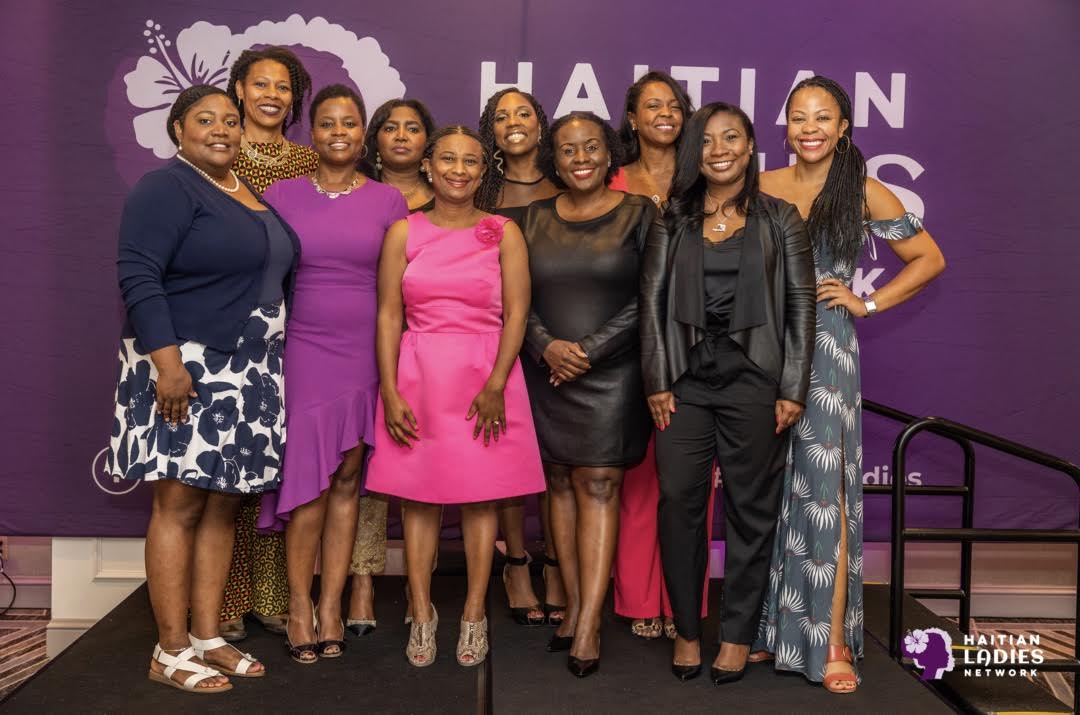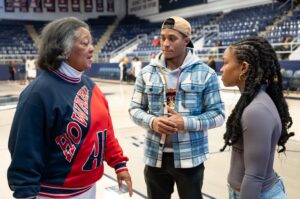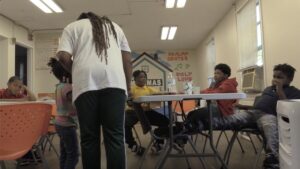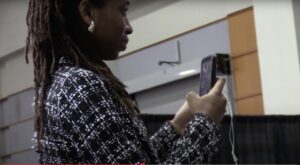By Gregory Smith, Howard University News Service
WASHINGTON – White House correspondent Yamiche Alcindor was among several speakers who encouraged women gathering for the Haitian Ladies Network’s annual weekend to harness their political, economic and personal power to deal with the realities of Haiti today, from the border crisis to the aftermath of the recent earthquake.
Alcindor’s message to the women was to find their purpose, community and personal time for themselves.
“There is always going to be more news, and there’s always going to be new things happening especially in our community,” said Alcindor, host of “Washington Week” for the PBS NewsHour and political contributor to MSNBC and NBC News. “There are going to be more people that need you and more things that you can do, but you have to take time for yourself.”
In addition to the COVID-19 pandemic and several hurricanes, Haiti has endured one crisis after another in recent months. On July 7, President Jovenel Moïse was assassinated in his private residence in the capital, Port-au-Prince. On Aug. 14, a massive 7.2 magnitude earthquake rocked Haiti’s southern peninsula, leaving at least 2,284 dead and more than 12,763 injured. Just two weeks ago, photos surfaced showing U.S. Border Patrol officers on horses whipping Haitians as they tried to enter the United States.
Alcindor told the women attending the “Igniting Our Power” event that she couldn’t separate being Haitian from being a journalist. She made headlines over the last few years after having numerous encounters with former President Donald Trump.
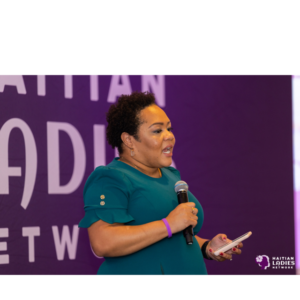
“It was in January 2018, and I had just quit my job at the New York Times,” Alcindor said. “I was sort of in a relief mode, because I hadn’t started at PBS yet. I got a call from my aunt while I was out shopping and hanging out with my fiancé, now husband.
“My aunt called me crying and said, ‘Did you hear what Trump said?’ I said, ‘No. What did Trump say?’
“‘He said Haiti is a s—hole country. So, what are you going to do about it?’
“I was like, ‘What?’ So, it can be a burden in some ways, but it’s an incredible privilege,” Alcindor said. “It’s an incredible blessing, because what other Haitian American is in my position to ask real questions and get real answers?”
Alcindor knew at 21 that she wanted to become a journalist, despite her father’s wishes that she become a lawyer. When she chose her profession, she didn’t think that so many people would be invested in her career.
“The thing that sustained me was my people and my community,” she said. “It was people that I got on Facebook or Facetime with to keep me going, so I implore you to lean on the people that are around you.”
She discussed being raised by a Haitian mother who didn’t show weakness the first 30 years of her life and taught her to do the same thing. Alcindor said she had to unlearn that, because it’s normal to take a step back when you’re feeling overwhelmed.
“Resiliency requires rest,” she said. “It requires you to take care of yourself; it requires you to really be invested in taking a day off.”
Alcindor said that being part of the Haitian Ladies Network warms her heart. It was one of the few organizations in Washington that she joined after relocating from Florida. She applauded the women in attendance for seeking community engagement virtually or in person at the Haitian Ladies Network’s 16th annual brunch and fifth symposium. Several Haitian women across the world made their way to Washington to engage in fellowship and discuss recent crises that Haiti is facing in workshops and panels.
Based in Washington, the Haitian Ladies Network is the largest platform connecting women and girls of Haitian descent across the world. A small brunch started by Nadine Duplessy Kearns with a group of friends has expanded to over 75,000 members globally.
Kearns said that when she moved to D.C., she couldn’t find a central network of Haitian women so she started having brunch with a few of them. The number of women attending brunch began to grow over the years, and now the organization is worldwide.
“This is a space where you don’t have to be anything but a Haitian woman,” Kearns said. “You can come together to reconnect.”
“We chose ‘Igniting Our Power’ as the theme this year to recharge everyone,” she said. “After the triple crises facing Haiti and centuries of escalating turmoil, we tweaked our event programming to include as much information as we need to empower.”
Karen Andre, a former political director for President Barack Obama and special assistant to President Joe Biden, held a master class informing women that they must organize, strategize and leverage the connections that they make.
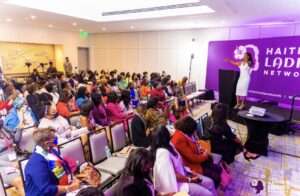
Andre told the women that their cultural norms are holding them back.
“The work is done in between the crises,” Andre said. “We are not proactive enough; we can’t wait until the hurricane is above our heads. Politics is created by us and governed by us. If we don’t get it together, we will continue to be the authors of our own misfortune.”
Guerline Jozef, president of the Haitian Bridge Alliance, expressed similar sentiments.
“I am so emotional, and I am upset,” Jozef said. “I am frustrated and pissed off at our community. We have to be accountable for our own misfortune. We must hold our elected officials in Haiti accountable.
“As I continue to be on the border and under the bridge making the sacrifices, I’m powerless most of the time,” she said. “The current administration decided to have a meeting with Haitian leaders. If we are not at the table, then we are on the menu.”
Shannon Laguerre, a senior immigration attorney, said that many Haitians are hesitant to give the U.S. government personal documents.
“I ask clients why don’t they apply for immigration benefits available to them,” Laguerre said. “They said that they are afraid and suspicious of the government; they don’t want to give them their documents. There’s all these amazing programs that are in existence for Haitians such as T visas and S visas.”
Andre reminded the women that other groups are willing to help, such as African Americans, Jamaicans and Africans. Haitian women have the potential to become the next Michelle Obama or Oprah Winfrey, she said, and building relationships can help move the needle forward.

